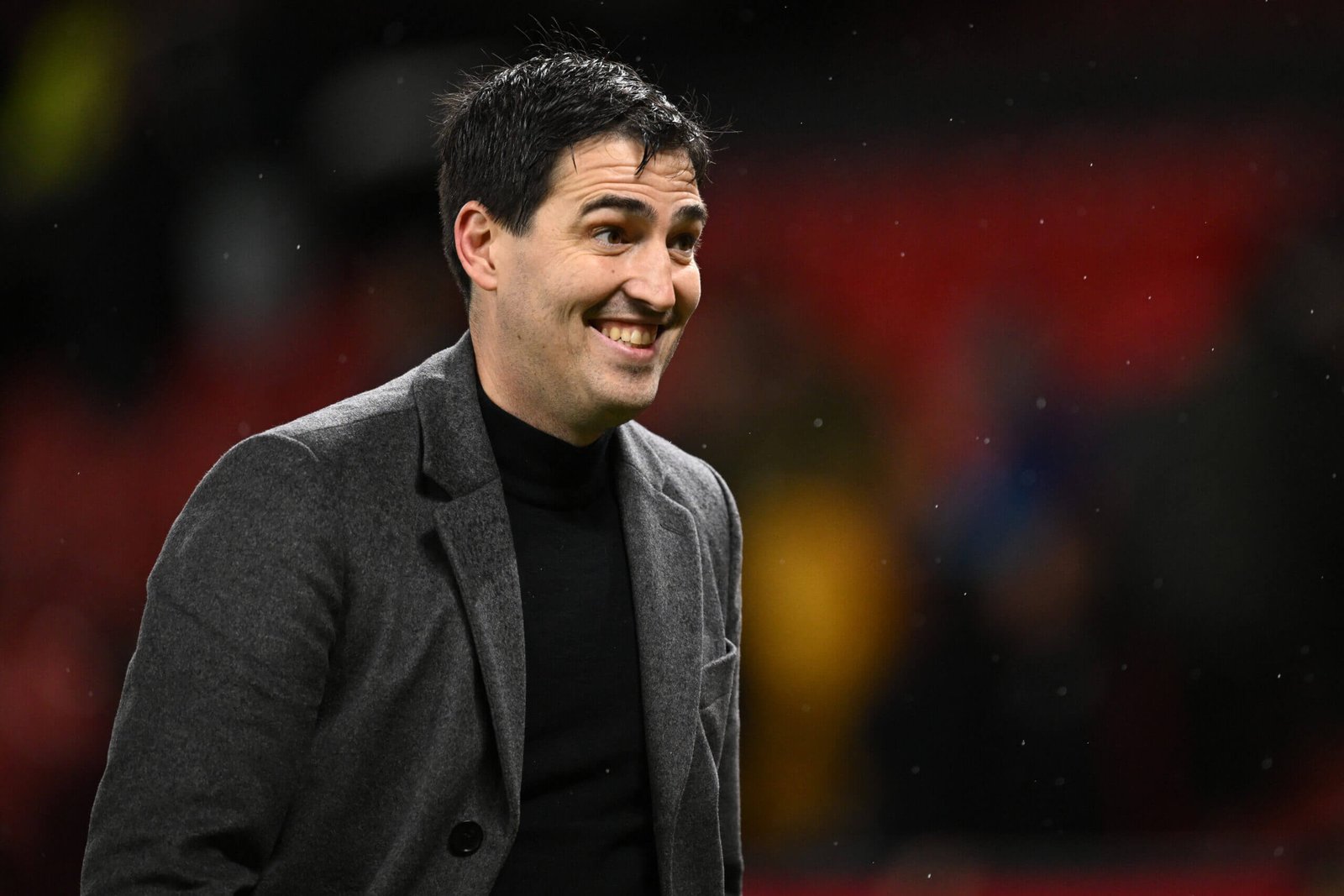For Andoni Iraola, football is a game of risk and reward. Barely six months into his Premier League career, we have already seen how that can go either way.
His philosophy is ambitious, built upon meticulous off-the-ball organisation and fearless commitment to the counter-press, but it has already proven to be transformative in his budding managerial career.
At Mirandes, who had recently been promoted to the second tier of Spanish football, he reached an unprecedented Copa del Rey semi-final, while his Rayo Vallecano side were adventurous and spirited, twice pushing for Europe as they beat Barcelona three times in the league.
It is why Bournemouth have stuck with Iraola, even after a nightmare start to his tenure in the early stages of this season. The proposed transition to aggressive, front-footed football under him at the Vitality Stadium was so quick that it was bound to be disorientating, and long-term aims were kept in mind as they failed to win any of his first nine Premier League games.
Unwavering support from within the club — particularly from technical director Richard Hughes — also pointed to off-pitch setbacks for their new manager, with Bournemouth unable to secure a work permit for his assistant coach Inigo Perez. Iraola’s house was not in order as a crunch home game against fellow strugglers Burnley approached, a match that may well have sparked internal rumblings about his future had it been lost.
In the end, that Burnley clash on October 28 was decided by a goal from Philip Billing — the longest-range effort by any Premier League team this season so far — and since then his plan has clicked into place, with Bournemouth winning seven of their past 10 games. A 3-0 demolition of Manchester United at Old Trafford was the highlight of four consecutive away victories, while wins over Newcastle United and Fulham were as comfortable as they felt inevitable.
Billing scored from neighbouring Hampshire against Burnley (Eddie Keogh/Getty Images)
Iraola has pulled it back from the brink, and if evidence from his homeland is anything to go by, his innovative methods will continue to pay dividends for Bournemouth.
Despite taking a while to settle in the season’s first couple of months, the numbers point to a fundamental change in approach by Bournemouth, particularly for a club who were so passive without the ball during their recent Premier League seasons.
In the previous one under Scott Parker (briefly) and Gary O’Neil, for example, only Nottingham Forest held a deeper defensive line than them, with Bournemouth completing defensive actions at an average of 22.9 metres from their own goal, while their 144 possession regains in the attacking third was also the second-lowest tally.
But this season, only five of the other 19 teams in the division — Aston Villa, Tottenham Hotspur, Arsenal, Brighton & Hove Albion and Manchester City — hold a higher line, while no club has scored more than Bournemouth’s seven goals after winning the ball back in their attacking third.
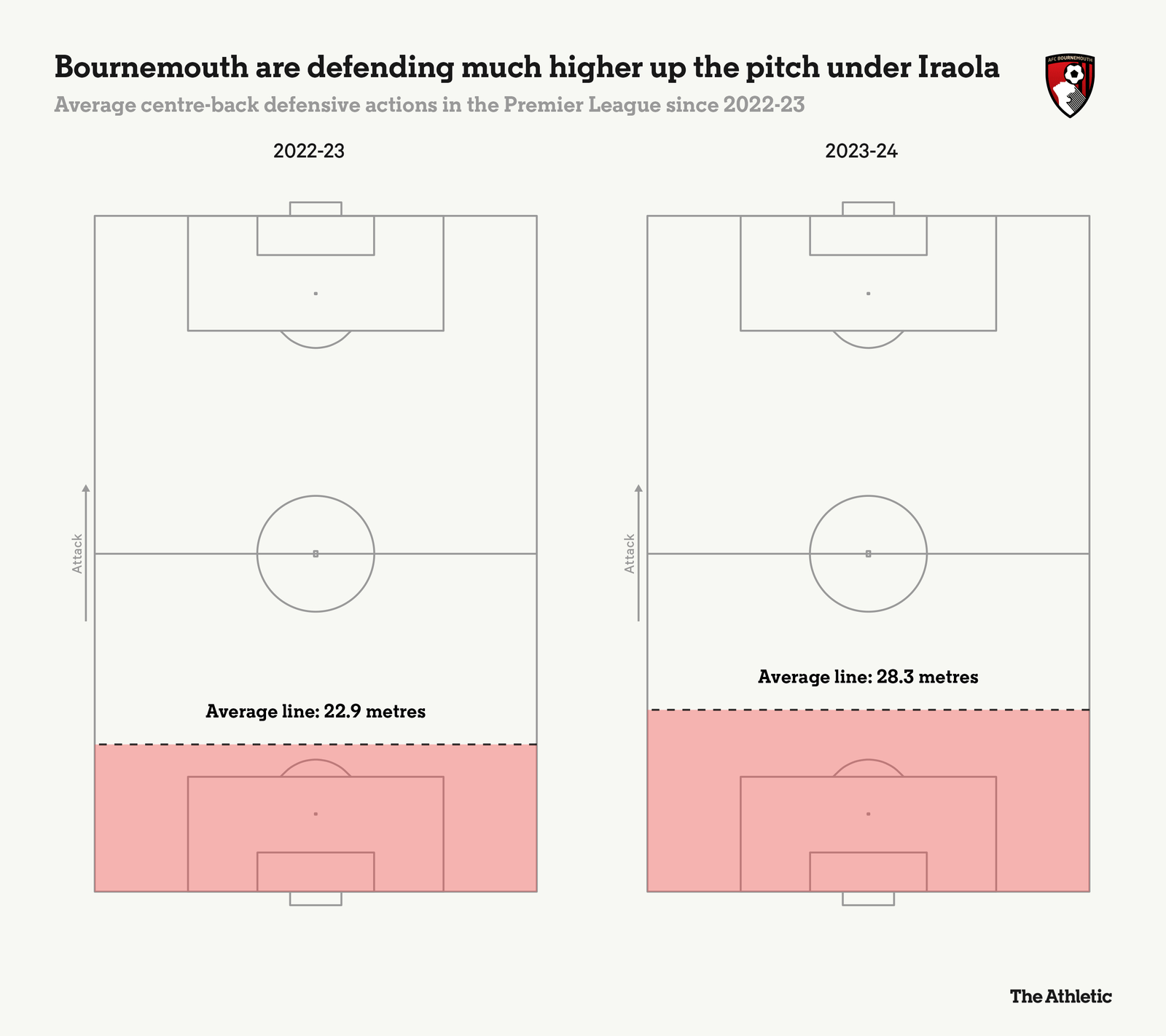
Iraola’s methods involve more than just hard running. His schemes to win the ball close to the opposition goal rely on collective cohesion from front to back, to jump up in support of your closest team-mate once they commit to the press. Without such backup, spaces can be exploited.
Striker Dominic Solanke outlined his initial struggles with Iraola’s philosophy last month, suggesting that Bournemouth’s “timing was off” when it came to their forward press, something that is now “natural” after hours of work on the training pitch.
“We didn’t know when to press or when to drop,” Solanke said, “but now it is second nature as the manager has gone through it many times.”
A good example of Bournemouth’s early season uncertainty came in late September’s 4-0 home defeat against Arsenal, who were able to keep the ball confidently in deeper areas to invite pressure and subsequently slice through their opponents with relative ease.
In the following sequence, Billing sees that he should join Solanke in the press, looking to follow Declan Rice and block the simple passing option to leave goalkeeper David Raya under pressure.
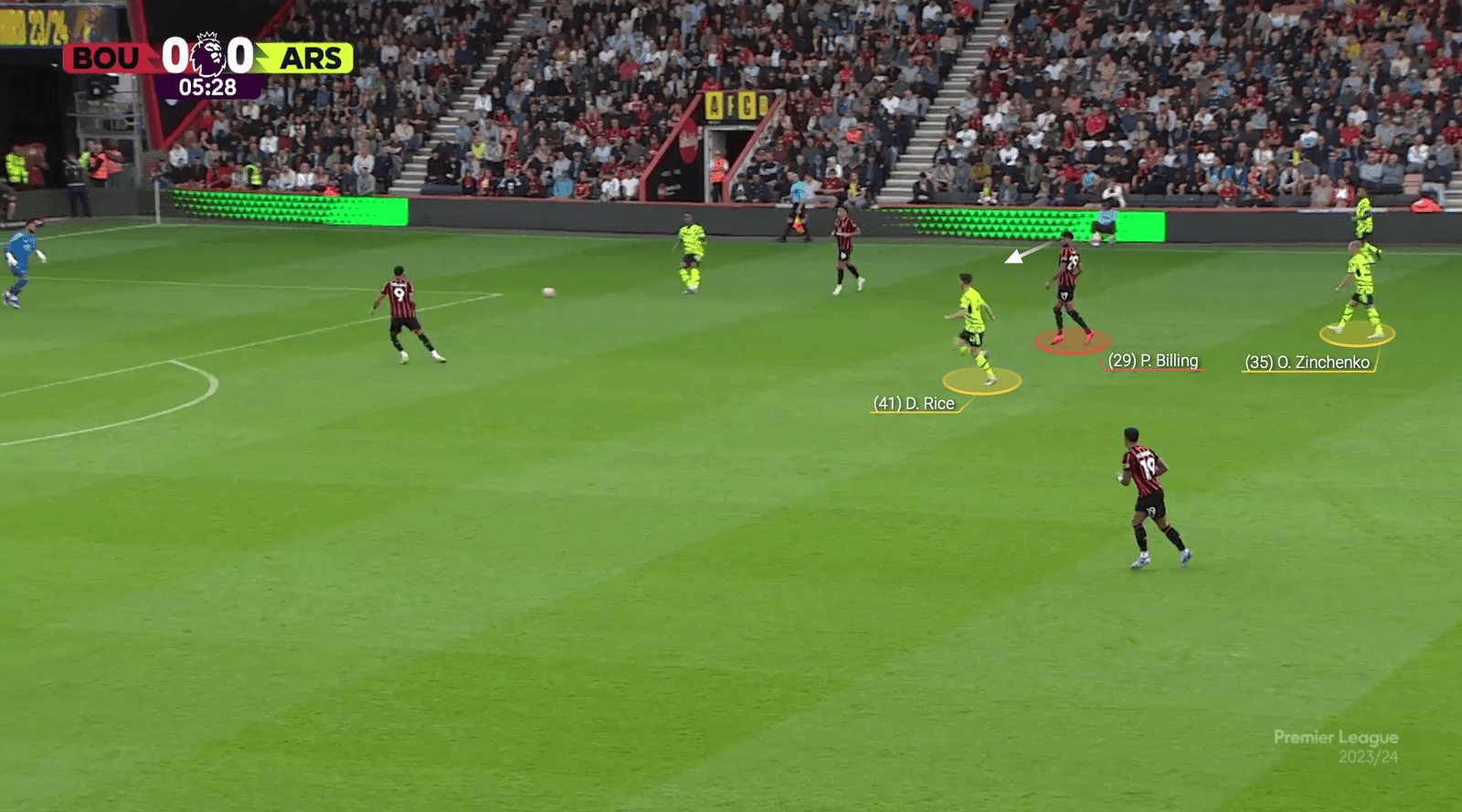
But Solanke does not assert pressure on the ’keeper and instead looks to block the pass out to his right, while Billing is clearly distracted by the presence of Oleksandr Zinchenko behind him, leaving Raya with time and space on the ball.

Billing beckons a team-mate forward to help cover Zinchenko, but as the ball goes back out wide, he drops back in himself.
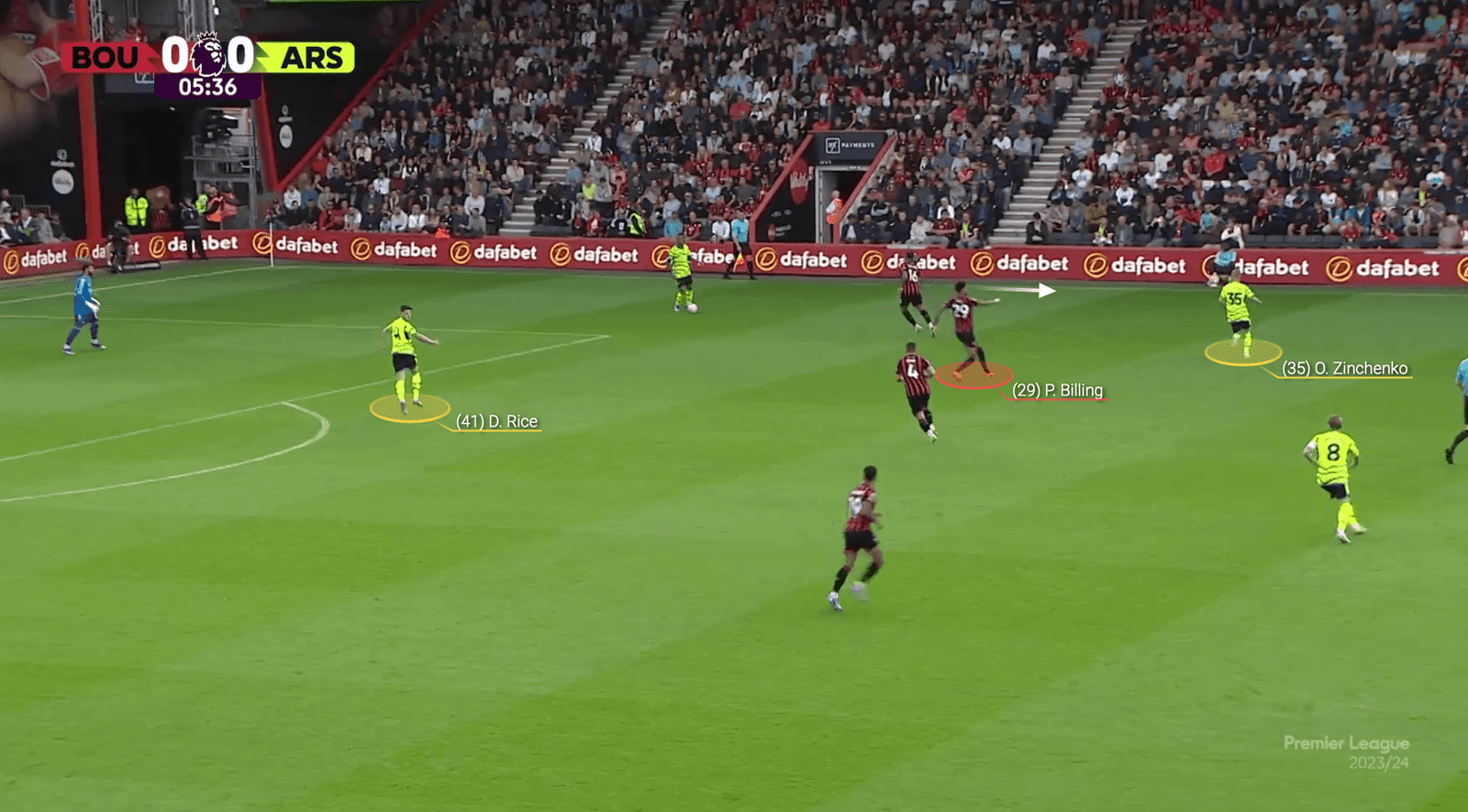
The ball is played back to Raya once more, and Billing again steps up to pressure Rice. In the space of 20 seconds and four Arsenal passes, Solanke has moved out wide, while Billing has applied pressure, dropped and then applied pressure once again.
Lewis Cook has also joined the forward line to shut off the pass to Martin Odegaard, and Bournemouth are now committed to blocking Arsenal in.
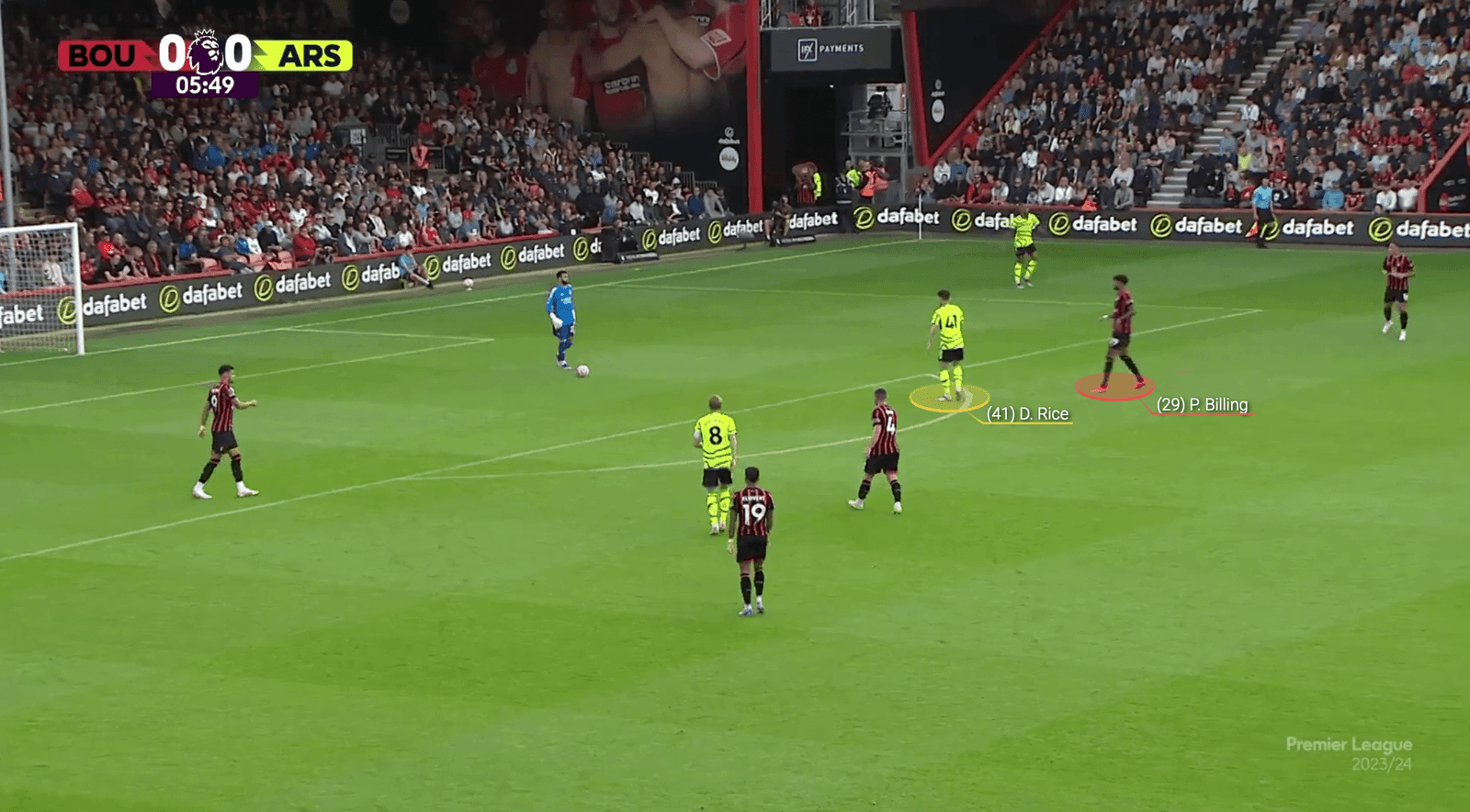
However, Billing’s fears are confirmed when Raya plays an incisive pass to Zinchenko, who has not been picked up quickly enough by the third Bournemouth midfielder, Ryan Christie. Suddenly, all those forward players are backtracking, with Odegaard also powering past Cook and on into midfield.
Without buy-in and close support from all players involved in the press, crucial gaps emerge and the system fails.
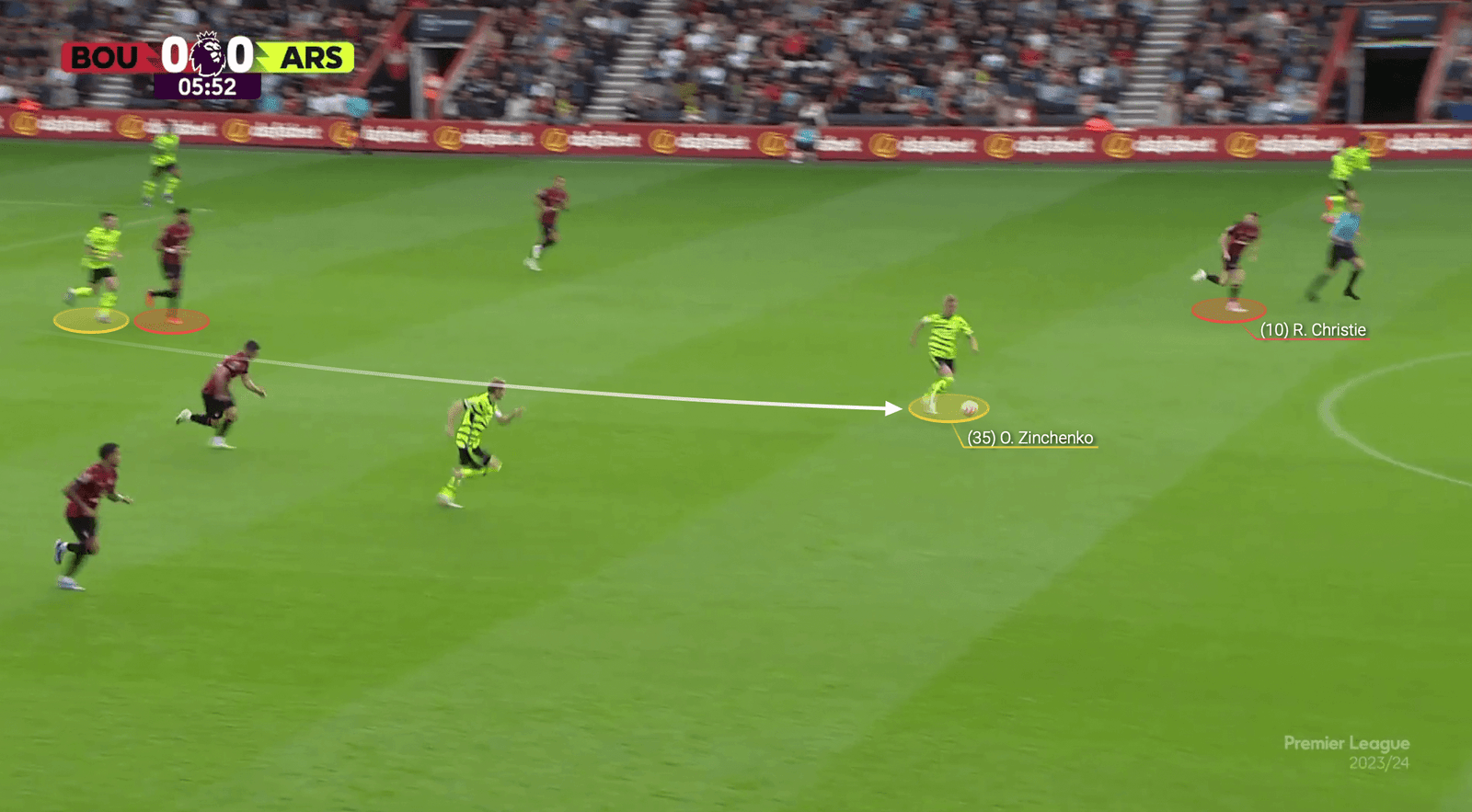
Three weeks of work on the training ground later, when Wolves visited, it looked as if progress had been made, even as Iraola’s team fell to another damaging defeat.
Bournemouth had identified Wolves’ left side as a weak spot in build-up, and looked to pounce whenever centre-back Toti Gomes let the ball run across his body. This trap was sprung like clockwork, again and again, with an infectious sense of enthusiasm coming from the sidelines.
In the below passage of play, as soon as Craig Dawson makes the pass out to the left, Solanke moves to block the return ball, while David Brooks jumps forward to apply pressure.
Toti plays it forward in frame two to Rayan Ait-Nouri, who is instantly put under pressure by Max Aarons, while midfielder Alex Scott helps to squeeze the space by tracking another midfield run. And in frame three, Ait-Nouri manages to find a pass down the line to Hwang Hee-chan, who is now engaged by centre-back Illia Zabarnyi.
This sequence typifies the energetic man-to-man system Iraola plays, and its chain reaction of pressure; even defenders need to step forward and chase his man into midfield, with Zabarnyi being encouraged by shouts of, “Go, Zaba! Go, go, go!” from his manager.
Frame four illustrates the final result, Hwang is surrounded, as Zabarnyi and Scott both jump into the challenge. On this occasion, however, the ball ricochets through to a Wolves player, and the visitors manage to escape.

It is a passage of play that highlights the peril inherent in Iraola’s ideas. Even when they are executed well, his team can still be played through if the final tackle is not seen through.
The Basque himself was crestfallen in the post-match interview that day, as a red card and a goalkeeping error saw his side give up their half-time lead and lose, 2-1. Nonetheless, as the players started to see results from their high-pressing efforts, there were flickers of belief that this new-look Bournemouth side could compete.
Another seven weeks down the line on December 9, the players were sharp and the system had been fine-tuned, and Bournemouth looked to set up ball-winning situations wherever they could. Their hunger for the high press was clear to see in a historic win over Manchester United, where, believing that they could catch their opponents out in the build-up, they were happy to go long and concede possession.
Straight from kick-off here, for example, Cook launches a pass towards the corner flag that flies out for a goal kick, and the visitors push on as United goalkeeper Andre Onana ambles out to retrieve the ball.
Christie’s enthusiasm to pen United in is evident — on his toes as he makes sure team-mate Marcus Tavernier is following him in the press in frame two. Seconds later, as United bounce the ball around without breaking through the press, it is Cook steaming in from midfield to intercept with a sliding challenge, before Solanke charges down a back pass and almost wins a penalty.
This is all within 45 seconds of the start of the game, and 20 seconds after a wayward pass went out of play.
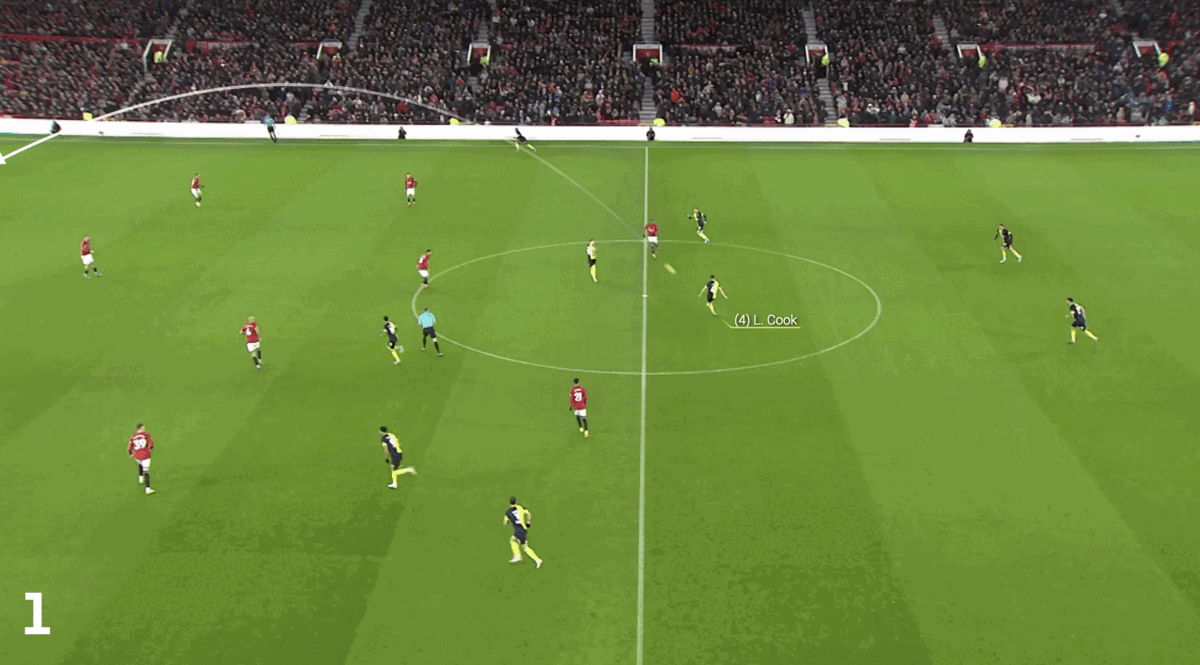
And again, 51 seconds before the opening goal in the fifth minute, it is centre-back Marcos Senesi who attempts an ambitious ball down the line.
It is overhit, and Bournemouth give up the ball once more. But United flounder in their build-up, and Cook steals in to win back possession, before bursting to the byline and squaring for Solanke to score. In contrast with the press against Arsenal in that September match, note just how quickly that third Bournemouth midfielder is ready to pounce — the timing and anticipation of the jump are now so much sharper.

In such a way, long balls coming from his centre-backs are a win-win under Iraola; accurate ones can be a great way to escape pressure and hit on the break, while overhit efforts force the opposition to restart from a deep position, allowing Bournemouth to press forward and take advantage of their opponent’s disorganised state.
This is why, at Rayo last season, both of Iraola’s centre-backs, Florian Lejeune and Alejandro Catena, ranked in the top five across La Liga for long passes attempted by outfield players.
While it’s not quite as extreme at Bournemouth, the below pass map paints a similar picture, with plenty of ambitious attempts from the central defenders to sweep long passes into the attacking third.

On New Year’s Eve, Iraola’s side limited hosts Tottenham to a pass completion rate of 79.2 per cent in their own half — Spurs’ lowest of the season, other than that chaotic night against Chelsea in November where they played most of the second half with nine men.
As the weeks pass by, Bournemouth have got significantly better at disrupting their opponents, and have developed a mutual understanding that has filled the squad with belief.
The results have swung dramatically, but it has been a gradual, non-linear process of improvement that has seen Bournemouth stretch clear of the Premier League’s bottom three.
Iraola’s system does not lend itself to consistent control over a season, and external factors can take hold. Luck is a big one, with the manager even admitting that everything fell their way in the 3-2 away win against Forest just before Christmas, after weeks of hopeless deflections and individual mistakes had threatened to derail his project before it could truly begin.
Solanke’s sudden uptick in finishing has helped to smooth out some of their rockier performances in recent weeks, particularly that day at the City Ground, where his first senior hat-trick sealed a dramatic comeback from a goal down to keep the momentum going.
“Today, we were lucky to have Dom with us,” said Iraola, visibly relieved, in his post-match interview.
Enjoy all six of @domsolanke’s goals in December 👊 pic.twitter.com/isBhnihVwP
— Premier League (@premierleague) January 12, 2024
Injuries have played their part too, with USMNT captain Tyler Adams still to play for the club after a summer move from relegated Leeds and talented 20-year-old Scott in and out of the side since his arrival in the same transfer window. Iraola has needed to be inventive, and the idea to move Christie into a deeper midfield role has proven to be inspired, allowing him to implement his high-pressing system without his full complement of ball-winning midfielders.
Even with these ups and downs, however, Bournemouth’s sheer proactivity will surely see them fall on the right side of chaos more often than not. Iraola’s former Rayo winger Isi Palazon summed that attitude up.
“At Rayo, we know that if we want to win, we need to receive the ball in dangerous positions,” Palazon said, “because, in the long run, more good things are going to happen from these situations than bad.”
Bournemouth meet their match this weekend, at home against a Liverpool side who lead the way in most high-pressing metrics — from high turnovers to passes per defensive action (PPDA) — in the Premier League this season. They pulled off a 1-0 win under O’Neil in this same fixture last season, despite 31 per cent possession and zero possession regains in the final third, but Sunday’s match is likely to be much more end-to-end.
Iraola’s time managing in Spain showed us he is a giantkiller. As seven Premier League teams have learned already, his Bournemouth team are reinvigorated and should not be taken lightly.
(Top photo: Oli Scarff/AFP via Getty Images)
Read the full article here


